The humanity is, at present, undergoing a highly significant transformational event, a “Time/Space Compression,” a globalization, that has begun to integrate and unite the people of the world like never before. In spite of this, or perhaps as part of this transformation itself, we read, see, listen and hear daily in social, electronic and print media, of violence, injustice, cries for democracy, and violations of human rights in different corners of the world. The anachronistic and barbaric beheadings of hostages by ISIS in West Asia, the horrendous kidnapping and murder of innocent civilians in Africa by Boko Haram, the heart-wrenching crisis in Syria, the tacit cultural acceptance of rape and domestic violence against women in India, the official and administrative suppression of human rights by the governments of China and North Korea, rise of white supremacists, Islamophobia and far right wing politics in America and Europe are some examples of the crises at this critical juncture in human history. Even though these examples of horrific wrongs in our world are perhaps cause to feel helpless, fatigued and fearful, there are International Institutions/organizations such as the EU, the UN, Red Cross, Doctors without Borders amongst others, who despite their hiccups, stands as beacons of hope in providing humanitarian assistances, political mediation, and strategies to solve conflict through peaceful methods.
With my own academic and theoretical involvement with the aforementioned International bodies through the course of my studies thus far, it was an extraordinary experience to be at the EU Parliament in person for a month as a stagier/intern. I believe that the experiences that I gained as an intern resonates well with my academic aspirations of becoming an advocate, a voice, not only for Tibetans, but for all oppressed and marginalized people in our world. At the EU Parliament, I listened to lively discussion, to poignant personal testimony, and at times, to heated argument on issues that concern all of humanity. (The word parliament itself comes to us from the Middle English and Old French parlement, which means “speaking”). Indeed, inside the EU Parliament in Strasbourg and Brussels, listening to the speeches of different members and delegations, my own aspirations seemed to be echoed by the architecture of Parliament itself, which soared far above the different voices of Parliament, it’s clear roof shed the sun’s light on us all. On a personal level, I had the opportunity to speak with and listen to many people of different cultural, political and economic backgrounds.
But before I recount some key moments during my internship at the European Parliament, it is perhaps appropriate to provide a brief background regarding the formation of the European Union and the role of the EU Parliament itself.
Background
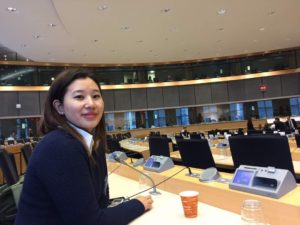 With improved economics for member countries as its raison d’etre, the European Union was established in 1958, as the European Economic Community (EEC), by the “Core Six” countries – Belgium, Germany, France, Italy, Luxembourg and the Netherlands. Economically devastated and exhausted by the destruction wrought by the two world wars, these Western European nations aspired for peace, prosperity and stability. As such, the Core Six understood that their first step should be to foster economic cooperation, with the premise that, “countries that trade with one another become economically interdependent and so more likely to avoid conflict.” The European Economic Community was renamed the European Union in 1993.
With improved economics for member countries as its raison d’etre, the European Union was established in 1958, as the European Economic Community (EEC), by the “Core Six” countries – Belgium, Germany, France, Italy, Luxembourg and the Netherlands. Economically devastated and exhausted by the destruction wrought by the two world wars, these Western European nations aspired for peace, prosperity and stability. As such, the Core Six understood that their first step should be to foster economic cooperation, with the premise that, “countries that trade with one another become economically interdependent and so more likely to avoid conflict.” The European Economic Community was renamed the European Union in 1993.
The European Parliament is the only institution of the EU which is directly elected by the people. 751 MEPs represent 28 member states of the EU in proportion to the population of the respective states, making it the second largest democratic electorate body in the world (after India). It is the only EU institution out of the three, the other two being the European Council and the European Commission, which has ceremonial precedence over all authority at EU and has equal legislative and budgetary powers. The European Commission, the executive body of the EU, is accountable to Parliament. Antonio Tajani, elected in January of this year, is the current president of Parliament. All the plenary sessions of the parliament take place in Strasbourg (France), and Brussels (Belgium) while Luxemburg is the administrative seat.
What began as an economic union gradually evolved into an internationally recognized political and economic entity, with its 28 member states wielding considerable power and say on a wide range of international issues related to health, migration, climate, security, justice, and international relations. Since its inception in 1958, the EU, arguably, has achieved its initial objectives of relative peace, stability and prosperity, as well as cooperation among the EU member states through abolition of borders, which enabled EU citizens to live, work and travel freely, and the creation of a single currency, the Euro, in 19 of its member countries. The EU has become something of a paradigm for international cooperation, and was awarded the Nobel Peace Prize in 2012 for its perseverance in promoting peace, stability, reconciliation, democracy and human rights in Europe as well as in the international arena.
However, this is not to say that the EU is without its problems and challenges. The disparity of the EU between its stated policies and their actual implementation, its indecisiveness and lack of resolve on certain issues, Britain’s referendum on June 23rd, 2016, to exit from EU, the rise of nationalism and right wing populism in EU member States (like the Netherlands’ Party for Freedom, The National Front in France, Hungary’s Fidesz Party, Italy’s Five Star Movement and Germany’s Alternative Fur Deutschland, Greece’s Golden Dawn), pose serious threats for the Union and its future. Nevertheless, the EU is still governed by a representative democracy: the 500 million EU citizens are directly represented in the European Parliament while the member states are represented by the Council and the Commission.
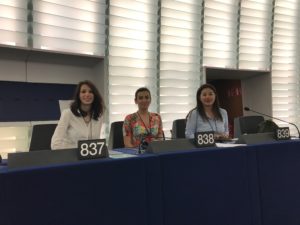 Personal Observations
Personal Observations
Staying in Ostend, Belgium, (which is an hour and a half travel time to the Parliament in Brussels) did not make for an easy commute, but this inconvenience was clearly offset by the educational experience. The European Parliament is, perhaps, the busiest parliament in the world, with an extraordinarily wide array of issues addressed throughout every week of its session. Besides issues directly concerning the 28 member states, the EP discusses and debates issues involving Asia, the Middle East, Africa and the USA. Of the issues raised during my time as intern, there were several topics that were especially relevant:
- The UN Secretary at the Parliament: António Guterres, former Portuguese PM and the ninth UN Secretary General, the second European Secretary General (after Austria’s Kurt Waldheim in early 1980s), in his first address at the European Parliament in Strasbourg, emphasized that, “a strong and united Europe is fundamental for an effective and efficient United Nations.” He further stated that, “the European Union is clearly the most successful project of peace sustainability in the world since the beginning of history.” The Secretary-General’s expansive (or perhaps exaggerated) claim that the EU has been the most successful project of peace sustainability in the world might be true for the last several decades since its inception, but whether this claim is true in its entirety is debatable. Today, with the rise of ultra-nationalism across Europe, schisms within the Union are more apparent than ever before, with some member states veering towards nationalistic policies and extreme right wing politics. The dramatic chaos that the Brexit has already created in the Union is a matter of concern for all the EU members, and it is a real possibility that other member states may follow Britain’s suit in the upcoming years. Had Maria Le Pen won the French election, France would have been the next member state to exit from the EU (a possibility already referred to as “Frexit”), provided her referendum was supported by the mandate of the French people.
- The Migration of Asylum Seekers into the Member States: Members of the European Parliament (MEPs) accused some national governments of deliberate procrastination regarding the Refugee Relocation Program adopted by the European Union (EU) in September 2015, which aims to assist the two most affected frontline member states (Greece and Italy) with the upsurge of migration/refugee arrivals. The MEPs maintained that a total of 160,000 asylum seekers were to be relocated from Greece and Italy to other member states before September 2017, but as of May 11, 2017, only 18,418 people have been relocated. Some MEPs blame the lack of political will on the part of member states while others accuse the member states of unfair, highly selective (and discriminatory) practices to determine who is allowed into their country.
The plenary debate, in short, echoed the varying opinions for and against migration in general.
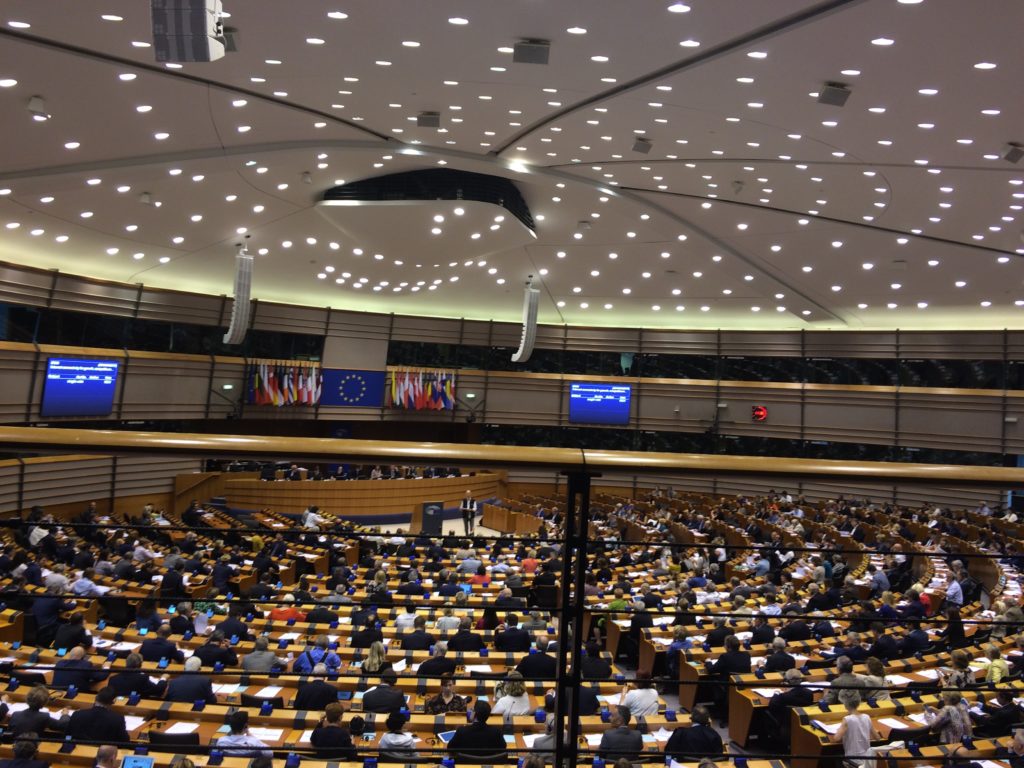 Angelika Mlinar (ALDE, Austria) observed: “It is not a question of ability, but of willpower. It’s high time for member states to follow through on the commitments they entered into.” Hungarian MEP Zoltán Balczó called immigration, “a danger to the culture and identity of Europe,” while Raymond Finch (EFDD, United Kingdom) emphatically claimed the EU’s response to the migration crisis would define the future of the Union. Finch said: “I urge you to look to the self-interest of your peoples and nations.” The debate ended on a positive but sombre note by Migration Commissioner Dimitris Avramopoulos, who emphasized the need for solidarity and shared moral duty of the member states to ensure protection of vulnerable people impacted by war and conflict. He, however, warned that if member states failed to meet their relocation commitments before the September deadline, the EU Commission is ready to act to address this infringement of EU policy. It appeared to me that, despite strong disagreements and opinions among the members of the Parliament, the EU still holds true to the principles on which it was founded, such as respect for freedom of speech, democracy, human rights and recognition of innate human dignity. The freedom of speech the MEPs exercise in Parliament is impressive and can be an example to other parliaments and legislative entities around the world. Any MEP who is not in favour of the point of discussion of any matter raised in the committee or plenary meetings can voice objection, and explain his or her point of view within an allotted time frame. This recognition of parliamentary procedure exemplifies the freedom of speech and expression that every Member of Parliament and the EU itself enjoys.
Angelika Mlinar (ALDE, Austria) observed: “It is not a question of ability, but of willpower. It’s high time for member states to follow through on the commitments they entered into.” Hungarian MEP Zoltán Balczó called immigration, “a danger to the culture and identity of Europe,” while Raymond Finch (EFDD, United Kingdom) emphatically claimed the EU’s response to the migration crisis would define the future of the Union. Finch said: “I urge you to look to the self-interest of your peoples and nations.” The debate ended on a positive but sombre note by Migration Commissioner Dimitris Avramopoulos, who emphasized the need for solidarity and shared moral duty of the member states to ensure protection of vulnerable people impacted by war and conflict. He, however, warned that if member states failed to meet their relocation commitments before the September deadline, the EU Commission is ready to act to address this infringement of EU policy. It appeared to me that, despite strong disagreements and opinions among the members of the Parliament, the EU still holds true to the principles on which it was founded, such as respect for freedom of speech, democracy, human rights and recognition of innate human dignity. The freedom of speech the MEPs exercise in Parliament is impressive and can be an example to other parliaments and legislative entities around the world. Any MEP who is not in favour of the point of discussion of any matter raised in the committee or plenary meetings can voice objection, and explain his or her point of view within an allotted time frame. This recognition of parliamentary procedure exemplifies the freedom of speech and expression that every Member of Parliament and the EU itself enjoys.
- The Appeal and Testimony from the Japanese Delegation. A very poignant event at the European Parliament during my internship was the visit of a Japanese delegation who spoke strongly against the abduction of Japanese nationals by North Korea. Some members of the Japanese delegation recounted how their own close relatives were abducted, and photos of many of these abductees were shown to the MEPs. The delegation appealed to the members of the European Parliament to raise the matter with North Korea. While the delegation members shared stories of their personal losses with us in the audience, I realized how similar these stories are to those of many Tibetan women and men, and how similar this is to the voices of our own Tibetan MPs, Tibetan activists sharing our own experiences of heart-breaking loss at platforms such as the European Parliament and other international arenas. Whether the European Parliament can help these Japanese families to recover those abducted is yet to be seen, but the recognition the EU gave to the Japanese delegation to voice these concerns over intrinsic human rights is heartening.
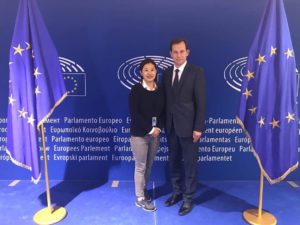 In sum, my month long internship at the European Parliament allowed me to hear many disparate voices addressing a wide range of issues pertaining to Europe as well as the world. And though there were many differing positions expressed, the importance of the universal principles of freedom of speech, expression, democracy and dignity resonated with all. One of my observations struck a deep personal chord with me. Throughout my time at the Parliament, I observed that out of the 751 MEPs, there were several members who, quite literally, could not speak or hear, but nonetheless held eminent positions in Parliament, and who, through education were highly capable of expressing their own thoughts and positions, which in turn were recognized as important aspects in the ongoing parliamentary debates. While, sitting in Parliament, listening to these differing voices, observing the differing manners in which they were articulated, I felt inspired and determined than ever before.
In sum, my month long internship at the European Parliament allowed me to hear many disparate voices addressing a wide range of issues pertaining to Europe as well as the world. And though there were many differing positions expressed, the importance of the universal principles of freedom of speech, expression, democracy and dignity resonated with all. One of my observations struck a deep personal chord with me. Throughout my time at the Parliament, I observed that out of the 751 MEPs, there were several members who, quite literally, could not speak or hear, but nonetheless held eminent positions in Parliament, and who, through education were highly capable of expressing their own thoughts and positions, which in turn were recognized as important aspects in the ongoing parliamentary debates. While, sitting in Parliament, listening to these differing voices, observing the differing manners in which they were articulated, I felt inspired and determined than ever before.

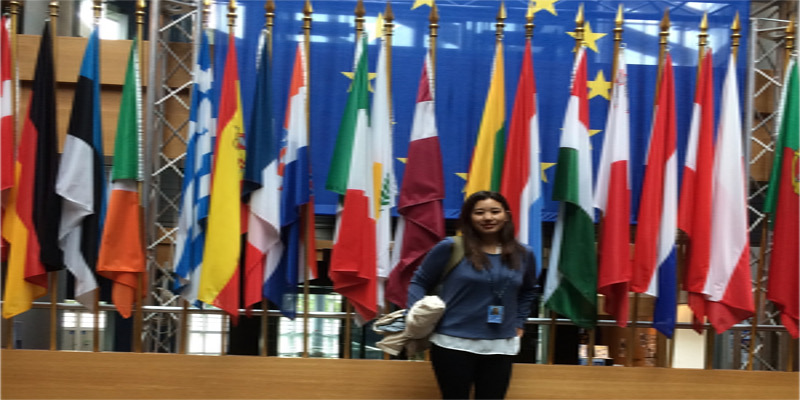





Leave a Reply